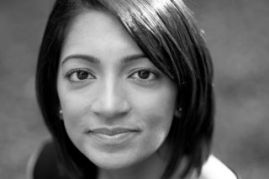“Letting Words Bear Down and Burn,” an interview with Dilruba Ahmed (poetry, ’09) appears online at RHINO.
…Bengalis hold the Bangla language very dear to them. It’s a very soft, beautiful, expressive, and poetic language—and a matter of regional and cultural pride and political import. Bangla (Bengali) was my first language, English my second. I grew up in a bilingual household in which, over time, my parents spoke Bangla to my sisters and me, and we responded in English. (To this day, this is typically how we communicate.) While my siblings and I have retained our comprehension of Bangla, our spoken Bangla lags behind.
I think that growing up that bi-cultural and bi-lingual environment deeply shaped my cultural identity—my lived experiences spanned more than the small towns where I grew up, and I was keenly aware of my parents’ “ghost homeland” that seemed to exist just out of reach. My bilingual upbringing also heightened my awareness of language, I think—I discovered early that a very funny story relayed by my mother in Bangla sometimes failed to have the same richness and deliciousness in English, for example; or that certain English words had no counterpart in Bangla. I learned, too, that languages could provide access and power as much as they could create barriers to communication and belonging.



